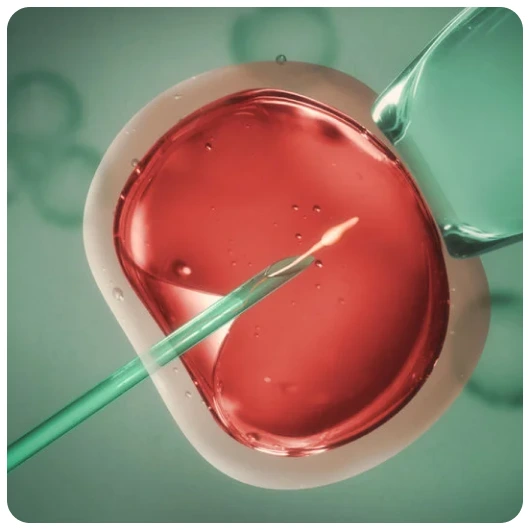IVF with donor eggs is the treatment of choice in cases where the female partner is unable to produce healthy eggs for fertilization with their partner’s sperm, or in cases where a female’s eggs could carry a genetic problem. In this condition, the eggs used for IVF process are provided by an anonymous egg donor.
What Is IVF With Donor Eggs?
IVF with donor eggs is a procedure where the mature eggs are retrieved from an anonymous female donor’s ovary, who is first screened in a series of tests before qualifying as an egg donor, and once fertilised with the male partner’s sperm, the resulting embryo is transferred in the female partner’s uterus, where it gets implanted and results in Pregnancy.
Process Of IVF With Donor Eggs
Visit By Patients For Medical Examination
Both the male and female partner visit the clinic for a thorough medical examination and blood tests. They also consult an embryologist.
Based on the blood investigation reports and Ultrasound scan, the fertility specialist determines the best IVF programme, appropriate for the couple and explains the treatment process in detail.
Selection Of Egg Donor
The couple is provided with a donor acquisition form. The specialist will help the couple select a donor from the profiles shared by the assisted reproductive technology (ART) bank.
The ART bank is registered with the Indian Council of Medical Research (ICMR) and only healthy donors who have passed all required tests are selected as egg donors.
At Medicover, we understand the importance of confidentiality and thus, the identity of patients and the donors are never disclosed and kept confidential.

Why Choose Medicover Woman and Child Hospitals

0
+ Expert Doctors
0
+ NICU & PICU Support
0
K+ Normal Delivery
0
+ Beds FacilityStimulation
The selected donor is monitored through blood investigations and an ultrasound on day two or three of the menstrual cycle. Based on the results, the ovaries are stimulated with fertility medication to promote the growth of follicles containing the eggs.This can last for up to 12 days.
The response of ovaries (quantity & quality of follicles) is monitored through ultrasonography and blood investigations at regular intervals. During this time period, the recipient also undergoes hormonal treatment to improve the uterus lining and to increase its receptivity.
Egg Collection
After eight to 12 days of taking the fertility medication, a trigger shot is administered to assist with final maturation of the egg.The egg donor then visits the clinic for the egg retrieval process, which will be performed 34 to 36 hours after the trigger administration.
Egg retrieval is a day care procedure that is performed with ultrasound guided aspiration, done under sedation to make it painless. The eggs are then retrieved and processed by embryologists in the ART laboratory.
Sperm Collection
On the same day, the male partner provides a fresh semen sample. If needed, sperms can be extracted from a testicle or epididymis in a separate procedure.
Fertilization
Different procedures can be used to fertilise the collected eggs. In this step, the sperms that were processed in the previous step are used to fertilise the donated eggs.
Each mature egg receives a single healthy sperm. Sixteen to 18 hours after the eggs and sperms have been brought together, they are checked to see if fertilisation has taken place.
The resulting embryo is then cultured in an incubator for up to 5 days.
Embryo Transfer
After evaluating the growth of the embryos, the embryologist decides upon the best embryo and the day for transfer into the uterus of the female partner.
After Transfer
After the embryo transfer, specialists may prescribe medicines which enhance the chances of embryo implantation. After the stipulated period, pregnancy tests are conducted to confirm pregnancy.
Ready to take control of your health journey?
Book your appointment now and start your path towards wellness today!
Frequently Asked Questions
Is IVF successful with donor eggs?
Yes, IVF using donor eggs can be highly successful, especially for women who cannot conceive with their own eggs. Success rates are often higher than with the woman's own eggs, particularly for older women or those with diminished ovarian reserve.
What are the disadvantages of donor egg in IVF?
While IVF with donor eggs offers a solution for many, there are potential downsides to consider. These include emotional aspects, concerns about disclosing donor use, and higher costs compared to traditional IVF.
Is IVF with a donor egg painful?
IVF procedures, including those with donor eggs, involve some discomfort but are typically not painful. Mild discomfort like bloating or cramping may occur during hormone injections, egg retrieval, and embryo transfer, but pain management options are available.
What is the cost of IVF with donor eggs?
IVF with donor eggs can vary widely in cost, often ranging from 2 lakhs to 2.5 lakhs or more per cycle. Factors such as clinic, location, donor compensation, and additional services affect the overall expense.
Who should go for donor egg IVF?
Donor egg IVF is recommended for women unable to conceive with their own eggs due to various factors like advanced age, low ovarian reserve, genetic disorders, or repeated IVF failures. It's also an option for single men or same-sex male couples pursuing surrogacy. Consulting a fertility specialist helps determine suitability.